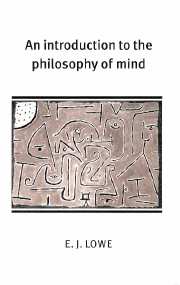Book contents
4 - Mental content
Published online by Cambridge University Press: 05 June 2012
Summary
We came to the conclusion, in the previous chapter, that mental states really do exist and can properly be invoked in causal explanations of people's behaviour. Thus, for example, it is perfectly legitimate to cite John's belief that it is raining amongst the probable causes of his action of opening his umbrella as he walks to work. In this respect, it seems, the commonsense judgements of ‘folk’ psychology and the explanatory hypotheses of ‘scientific’ psychology are broadly compatible with one another, whatever eliminative materialists may say to the contrary. However, when we try to understand more fully how propositional attitude states can be causally efficacious in generating bodily behaviour, some serious difficulties begin to emerge. So far, we have described propositional attitude states – ‘attitudinal states’, for short – as involving a subject's ‘attitude’ towards a proposition. The proposition in question constitutes the state's propositional content. And the attitude might be one of belief, desire, hope, fear, intention or whatnot. The general form of a statement ascribing an attitudinal state to a subject is simply ‘S ϕs that p’, where ‘S’ names a subject, ‘ϕ’ stands for any verb of propositional attitude, and ‘p’ represents some proposition – such as the proposition that it is raining. An example is provided by the statement that John believes that it is raining and another by the statement that John fears that he will get wet.
- Type
- Chapter
- Information
- An Introduction to the Philosophy of Mind , pp. 69 - 101Publisher: Cambridge University PressPrint publication year: 2000



